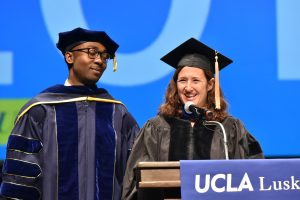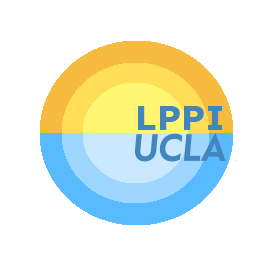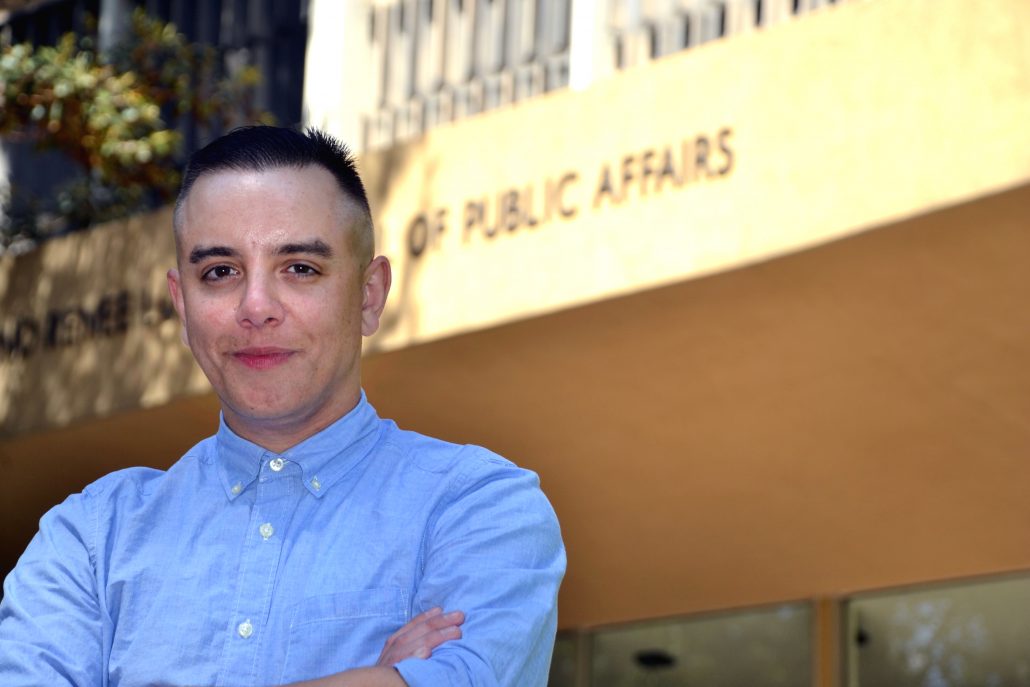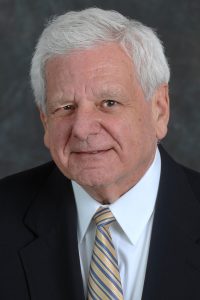California Entering Decade of Disruption, as Power System Shifts Dramatically
Communities across California have formed Community Choice Aggregators (CCAs) at a rapid rate since 2010, with over half of them starting within the last two years. County and city governments administer CCAs as local alternatives to investor-owned utilities. “The Growth of Community Choice Aggregation: Impacts to California’s Grid,” a new report produced by Next 10 and written by JR DeShazo, Julien Gattaciecca and Kelly Trumbull MPP ’17 of UCLA’s Luskin Center for Innovation, finds that if current growth trends continue, CCAs may serve a majority of California’s power consumers within the next 10 years, transforming California’s retail electricity sector. According to the report, the rise of CCAs has both direct and indirect positive effects on overall renewable energy consumed in California, helping contribute to the state meeting its 2030 RPS targets approximately 10 years in advance. Even with such an important impact on the penetration of renewable energies, CCAs’ effects on the grid have been negligible so far. This is in part because when a CCA starts, it handles the needs of existing electric customers, and often gets power from existing power plants. In the long term, though, CCAs’ impact on the grid depends on their energy procurement strategies and their local investments. “The public and local nature of CCAs positions them to implement local energy programs that will help to reduce or shift energy consumption, benefiting the grid as well as their customers,” DeShazo said.

Photo by iStock / oveguli
Social Welfare Ph.D. Faculty Ranked Among Top Three in Scholarly Productivity

Social Welfare Chair Laura Abrams, right.
UCLA Luskin’s Social Welfare doctoral program is one of the top three most productive in the nation, according to a newly published study measuring the impact of faculty research. “The search for meaningful metrics of program excellence has been a longstanding effort by social work schools and colleges,” the researchers said. To understand variations in faculty productivity, they built upon previous work analyzing scholarly citations by considering the impact of a program’s funding sources, regional location, year of establishment and faculty demographics. “Researchers are not expected to build knowledge in a vacuum,” the study said. “Rather, it is a professional expectation that researchers also demonstrate the ability to disseminate knowledge widely despite the narrowness of their specialty area.” The analysis found that the three most productive social work doctoral faculties were based at public universities in the West: the University of Washington, UC Berkeley and UCLA Luskin. “One surprising finding was that there were significant differences among programs with the same size but located in different parts of the country,” the researchers said. “Why Western and Midwestern programs outperform their Northeastern and Southeastern counterparts is unclear.” The research, published in the journal Scientometrics, was based on empirical data from the entire population of doctoral tenure-track social work faculty at 76 research-oriented universities.
LPPI Co-Hosts Conference of Latino Elected Officials From Across the U.S.

Elected officials from over a dozen different states, including state legislators, municipal and school district officials, gathered Aug. 3-5 at UCLA Luskin for a landmark conference co-hosted by the Latino Policy and Politics Initiative (LPPI). More than 60 elected officials were expected to participate in the first-ever National Association of Latino Elected and Appointed Officials (NALEO) National Education Leadership and Public Policy Academy to learn about effective public policies that support Latino families and communities. NALEO Educational Fund and LPPI designed an innovative public policy curriculum to strengthen the governance capacity of Latino policymakers in the critical policy areas of education, economic development, criminal justice and immigration. “UCLA is ecstatic to partner with NALEO Educational Fund to empower Latino elected officials with the data and strategy necessary to address today’s most critical policy challenges and improve the well-being of Latinos from Connecticut to California,” said Sonja Diaz, LPPI’s executive director. The invitation-only intensive training featured modules created by LPPI faculty, with a cadre of national policy experts and practitioners from across the U.S. advancing evidence-based policymaking. Conference speakers included Diaz and her LPPI co-founders — UCLA Luskin Dean Gary Segura and Matt Barreto, professor of political science and Chicano/a Studies at UCLA — as well as LPPI-affiliated faculty such as Amada Armenta, who recently joined the faculty of UCLA Luskin Urban Planning. NALEO Educational Fund Executive Director Arturo Vargas also participated.
Santos Sees Developmental Science Through Intersectional Lens
Social Welfare Assistant Professor Carlos Santos is the co-editor of the latest publication of the journal New Directions for Child and Adolescent Development. Santos, who recently joined the UCLA Luskin faculty, is also a co-contributor to the special edition titled, “Envisioning the Integration of an Intersectional Lens in Developmental Science.” With a background in developmental psychology, Santos notes that he “adheres to the belief that developmental phenomena must be studied across diverse disciplines and perspectives,” and this project draws on the “largely interdisciplinary interpretive framework of intersectionality” — a view underscoring “how systems of oppression overlap to create inequities,” including heterosexism, racism, ableism or issues affecting those who are undocumented. His research has focused on gender and ethnic identities, stereotypes and their impacts on social adjustment, mental health and educational outcomes among adolescents and young adults in communities of color. Citing the relative lack of an intersectionality lens in the developmental sciences, Santos and co-author and editor Russell B. Toomey designed the publication to bring together developmental scientists who are actively incorporating intersectionality scholarship into their research. Each of the contributors was asked the following question: How can an intersectionality perspective inform the developmental phenomena of interest and particular developmental theories you draw upon in your area of research? “A lot of this piece is grappling with how to reinvent all of this to better capture the ways in which oppressions overlap. I really feel committed to that goal, to better understand that.”

Carlos Santos
Joint MPP/JD Student Argues in Federal Court
A UCLA School of Law story highlighted Taylor de Laveaga, a joint Luskin School MPP and UCLA Law School student, who recently presented a constitutional case in the United States Court of Appeals for the Ninth Circuit in Seattle, Washington. Just one year into her legal studies, de Laveaga introduced and presented arguments for a First Amendment case to the three-judge panel, each testing her on points of law relevant to the controversy. The case, Rynearson v. Ferguson, challenges Washington’s current law on cyberstalking. Without missing a step, de Laveaga — who prepared extensively for the case with UCLA Law professor Eugene Volokh — answered all of the judges’ questions and was cited by the court for an admirable first appearance in court. “Your colleague has done a good job of presenting the case,” commented Senior Circuit Judge Richard Clifton to Volokh, who also participated.
Carnesale Joins Board of California Council on Science and Technology
 The California Council on Science and Technology (CCST) has added Albert Carnesale, UCLA chancellor emeritus and professor emeritus of public policy and mechanical and aerospace engineering to its Board of Directors. Also joining the board, which provides strategic vision and direction for CCST, is Alexandra Navrotsky of UC Davis. “Dr. Navrotsky and Dr. Carnesale have made exceptional contributions to their respective scientific fields and applications on the global stage,” said CCST Board Chair Charles F. Kennel in a news release. “Their deep insights and experiences into the societal importance of science and technology will greatly inform CCST’s mission and service to state leaders in California.” Carnesale joined UCLA in 1997 and was chancellor through 2006. He is the author or co-author of six books and more than 100 articles on a wide range of subjects, including national security strategy, arms control and nuclear proliferation. CCST is a nonpartisan, nonprofit organization that engages experts in science and technology to advise state policymakers.
The California Council on Science and Technology (CCST) has added Albert Carnesale, UCLA chancellor emeritus and professor emeritus of public policy and mechanical and aerospace engineering to its Board of Directors. Also joining the board, which provides strategic vision and direction for CCST, is Alexandra Navrotsky of UC Davis. “Dr. Navrotsky and Dr. Carnesale have made exceptional contributions to their respective scientific fields and applications on the global stage,” said CCST Board Chair Charles F. Kennel in a news release. “Their deep insights and experiences into the societal importance of science and technology will greatly inform CCST’s mission and service to state leaders in California.” Carnesale joined UCLA in 1997 and was chancellor through 2006. He is the author or co-author of six books and more than 100 articles on a wide range of subjects, including national security strategy, arms control and nuclear proliferation. CCST is a nonpartisan, nonprofit organization that engages experts in science and technology to advise state policymakers.
Maps Show Gentrification, Displacement Policies
The Center for Neighborhood Knowledge (CNK) at UCLA Luskin has updated its website to offer two important online resources: an inventory and map of anti-displacement policies in Los Angeles County, and a map of neighborhood change and gentrification in Southern California. The map of anti-displacement policies utilizes data collected between February and May of 2018, and it reflects CNK’s first step to highlight and better understand the policies that can promote affordability or mitigate displacement of vulnerable populations in gentrifying neighborhoods. Among the findings is the fact that despite a wide range of anti-displacement policies and strategies in Los Angeles County, their coverage is fragmented and implementation is not equitably distributed across jurisdictions. CNK’s urban displacement map reflects an update to a resource first provided in 2016. It focuses on understanding where neighborhood transformations are occurring and helps identify areas that are vulnerable to gentrification and displacement in both transit and non-transit neighborhoods. One of the key findings in this update is that the number of gentrified neighborhoods (based on census tracts) rose by 16 percent in Los Angeles County between 1990 and 2015.
